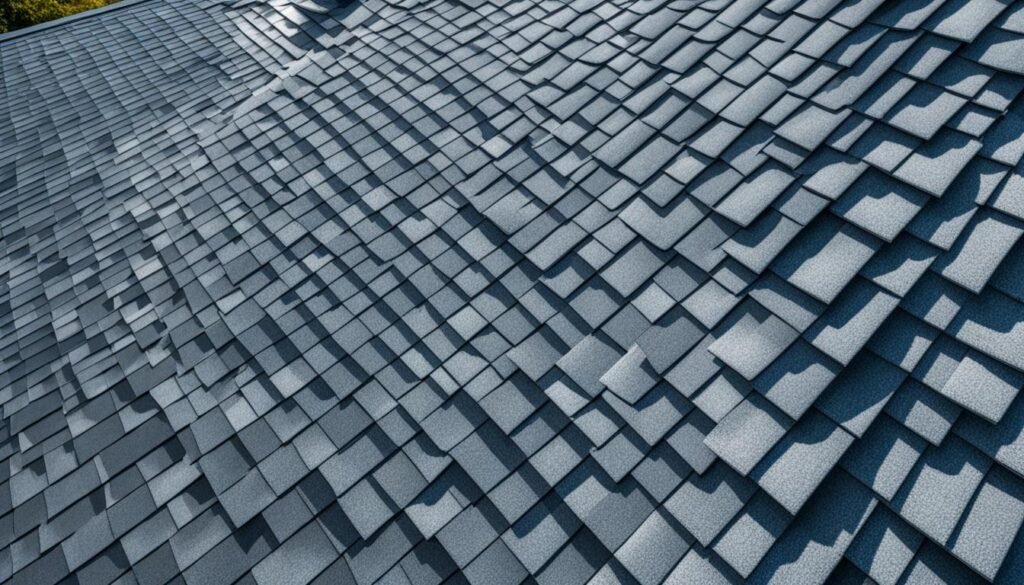Algae growth on roofs can damage them and lead to expensive repairs. Nearly 80% of US homes risk algae growth at some point. This fact shows why it’s crucial to find ways to stop algae growth.
Choosing algae resistant shingles is a smart move. They add a layer of roof protection and offer benefits for its durability and look. These shingles stop algae, moss, and mildew, often seen in warm, humid places. They have special granules, like copper or zinc, to keep these organisms away.
With algae resistant shingles, your roof stays stain-free and looks clean. They also boost your home’s curb appeal. This is great whether you’re selling your home or just want to enhance its beauty.
When looking at algae resistant shingles, check out top brands. CertainTeed’s StreakFighter, GAF’s StainGuard Plus, Atlas with Scotchguard 3M, Owens Corning’s StreakGuard™, and Malarkey are known for stopping algae growth effectively.
But remember, algae resistant shingles cost more than traditional ones. Installation prices vary by location. Always talk to a roofing pro to see what fits your needs and budget. They can tell you what’s available nearby.
Key Takeaways:
- Algae growth on roofs can cause damage and costly repairs.
- Algae resistant shingles provide an extra layer of protection and prevent the growth of algae, moss, and mildew.
- Popular algae resistant shingle options include CertainTeed’s StreakFighter technology, GAF’s Time-Released StainGuard Plus, Atlas algae resistant shingles with Scotchguard 3M, Owens Corning’s StreakGuard™ algae resistance protection, and Malarkey algae resistant shingles.
- Algae resistant shingles can help protect the roof from stains, enhance curb appeal, and increase the value of a home.
- Consult a professional roofing company for recommendations and advice on the best algae resistant shingles for your area.
Organic Asphalt vs Fiberglass Asphalt Shingles
When picking the right shingles for your roof, you have several choices. Two common ones are organic asphalt shingles and fiberglass asphalt shingles. Understanding their differences can help you choose based on your needs and likes.
Organic Asphalt Shingles
Organic asphalt shingles use a paper or felt soaked in asphalt. They’re then coated with more asphalt and ceramic granules. This creates a shingle that’s great at protecting against weather, algae, and fading. These shingles can last about 20 years and do very well in cold weather.
Though organic asphalt shingles offer durability and protection, they cost more than other options. The organic materials used in making them drive up the price. However, their long life and algae resistance offer long-term savings.
Fiberglass Asphalt Shingles
Fiberglass asphalt shingles have a fiberglass mat soaked in asphalt. This makes them light and easy to install. They’re known for being fire resistant, withstanding heat, and durable.
Unlike organic shingles, fiberglass shingles don’t do as well in cold. But, they are less expensive and a good option for many homeowners. They can also have copper coating to stop algae growth, appealing to those worried about algae.
Fiberglass shingles are also good for the environment because they’re recyclable. This minimizes their environmental impact.
They come in styles like 3-tab or architectural shingles, too. This allows homeowners to pick a style that fits their house’s look.
Even if fiberglass shingles cost more upfront, they last up to twice as long as organic asphalt shingles. This makes them a smart investment.

Comparison
The main differences between organic and fiberglass asphalt shingles include:
- Construction: Organic shingles use paper or felt and asphalt, while fiberglass shingles use fiberglass and asphalt.
- Durability: Organic shingles resist weather and algae for up to 20 years. Fiberglass shingles offer fire and heat resistance and last longer.
- Cost-effectiveness: Organic shingles have a higher initial cost but save money over time. Fiberglass shingles are cheaper and have a longer life.
- Environmental impact: Fiberglass shingles are eco-friendly and can be recycled.
- Installation: Both shingle types are easy to install, but fiberglass is lighter and simpler to handle.
- Styles: Fiberglass shingles come in more styles for more customization options.
Choosing between organic and fiberglass asphalt shingles depends on what you need, your budget, and your preferences. Talking to a professional roofing company can help. They can offer insights and recommendations to help you pick the best shingles for your home.
Conclusion
When thinking about algae resistant versus traditional shingles, several factors are critical. Consider your needs, budget, climate, and how much work you want to put into maintenance.
Algae resistant shingles add protection against algae, moss, and stains. They boost your home’s look and its value too. But remember, they cost more than traditional shingles.
Organic asphalt shingles stand up well to weather and algae. They also resist fading. But fiberglass asphalt shingles have their perks, like being fireproof, holding up to heat, and easy to put up. Organic ones are better for cold places, while fiberglass works well in heat.
The price of algae resistant shingles depends on the brand and quality. Choosing between them and traditional shingles comes down to what you like and need for your roof. For the best advice, talking to a professional roofing company is smart.
